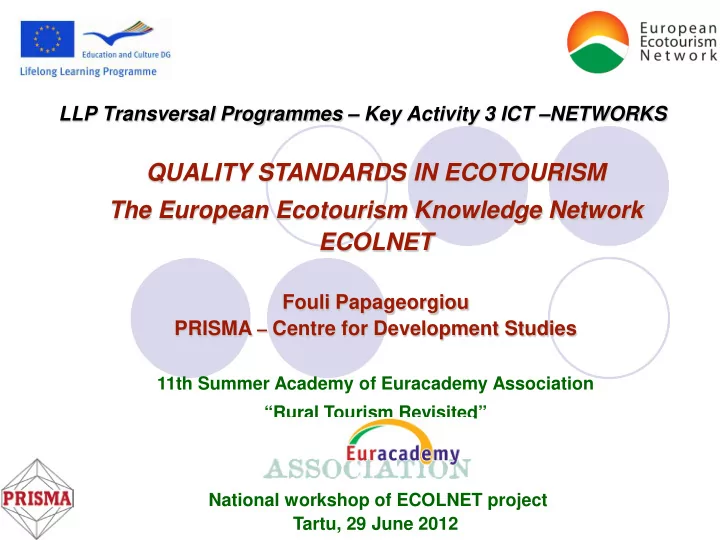

LLP Transversal Programmes – Key Activity 3 ICT –NETWORKS QUALITY STANDARDS IN ECOTOURISM The European Ecotourism Knowledge Network ECOLNET Fouli Papageorgiou PRISMA – Centre for Development Studies 11th Summer Academy of Euracademy Association “Rural Tourism Revisited” National workshop of ECOLNET project Tartu, 29 June 2012
ECOLNET Identity Supported by the Lifelong Learning Programme of the European Commission, Multilateral Networks KA3-ICT A network of rural/eco/sustainable tourism associations, education institutions and experts: PRISMA Centre for Development Studies, Greece, project leader ECOTRANS e.V , Germany Estonian Ecotourism Association, Estonia Estonian University of Life Sciences, Estonia ECOTONO - Equipo consultor en turismo y desarrollo, Spain Silvacultura ltd, Finland Centro Turistico Studentesco e Giovanile – CTS , Italy Imaginary srl, Italy Pan Parks Foundation – the Netherlands ECEAT – Projects, the Netherlands Association of Ecotourism in Romania, Romania Edinburgh Napier University, U.K
Project aims ECOLNET remit: to set up a European Network with a focus on ecotourism quality and the European Ecotourism Labelling Standard (EETLS) ECOLNET builds on the results of the LdV ECO-DESTINET project which developed EETLS along the lines of the Global Sustainable Tourism Criteria (Global Sustainable Tourism Council - GSTC) EETLS has been now recognised by GSTC ECOLNET aims to: Establish an online evaluation methodology and tools for certifying EETLS Support the evaluation tools with e-learning packages for EETLS evaluators and ecotourism businesses Deliver the tools and learning packages through an online community of interest which os based on the membership of EEN
Target Groups ecotourism & sustainable tourism businesses ecotourism certification agencies ecotourism-related or nature-related NGOs protected area authorities regional and national authorities European and international organisations related to ecotourism and sustainable tourism education institutions experts in the fields of tourism, tourism-related education and ICT)
ACTIVITIES AND PRODUCTS Consultation campaign amongst ecotourism certification agencies to receive feedback on EETLS and survey certification procedures adopted Refined EETLS criteria, sub-criteria and indicators – minimum criteria defined Library of best practice to illustrate the criteria and sub- criteria of EETLS Skills and competence needs of EETLS evaluators and of businesses wishing to be EETLS certified Learning content addressing the skills and competence needs of ecotourism businesses and EETLS evaluators
PRODUCTS Three online evaluation tools for EETLS certification: a) compliance assessment of ecotourism labels, b) self-assessment of businesses, c) integrated assessment by evaluators Training package supporting ecotourism businesses wishing to be EETLS certified Training package supporting EETLS evaluators
PRODUCTS European Ecotourism Network (EEN) and online learning community drawing support from the network multilingual website www.ecotourism-network.eu EEN / online community platform brochure newsletters national workshops international conference
European Ecotourism Labelling Standard EETLS The need: Harmonise existing European ecotourism labelling systems and strengthen the position of labelled businesses in the tourism market. Development principles: EETLS assures comparable standards of service in relation to a core group of baseline quality criteria EETLS to become a platform of communication for European ecotourism initiatives EETLS “should not reinvent the wheel ” – it is built along the lines of the Global Sustainable Tourism Criteria, adapted to ecotourism particularities
European Ecotourism Labelling Standard EETLS Development process: Review of more than 1200 individual criteria Filter them through the International Ecotourism Society’s (TIES) definition of ecotourism Categorise them according to GSTC Adapt them to European conditions Consult with current European initiatives (EUROPARC, PAN PARKS, Nature’s Best, EcoRomania) on the first draft in February 2009 Second round of consultation campaign in 2011-2012, with 20 European initiatives approached, 13 responded with detailed comments on the EETLS criteria and sub-criteria
European Ecotourism Labelling Standard EETLS 4 Groups of criteria A. Demonstrate effective sustainable management. B. Maximise social and economic benefits to local communities and minimise negative impacts. C. Maximise benefits to cultural heritage and minimise negative impacts. D. Maximise benefits to the environment and minimise negative impacts. 38 criteria 94 Sub-criteria 94 indicators for certificates 94 indicators for businesses 130 implementation indicators
European Ecotourism Labelling Standard EETLS A Group of Criteria: Sustainable management A.1 Management System A.2 Legal Compliance A.3 Employee Training A.4 Customer Satisfaction A.5 Marketing Accuracy A.6 Design and Construction of Buildings and Infrastructure A.6.1 Local Zoning A.6.2 Design and Siting A.6.3 Sustainable Construction A.6.4 Special Needs Access A.7 Interpretation A.8 Compliance of activities with special regulations in protected areas A.9 Raise visitors’ sensitivity of the host destination
European Ecotourism Labelling Standard EETLS B Group of Criteria: socio-economic impact B.1 Community Development B.2 Local Employment B.3 Fair-Trade B.4 Local Entrepreneurs B.5 Indigenous Communities B.6 Exploitation B.7 Equitable Hiring B.8 Employee Protection B.9 Basic Services
European Ecotourism Labelling Standard EETLS C Group of Criteria: Cultural heritage C.1 Cultural Code of Conduct C.2 Historical Artefacts C.3 Protection of Sites C.4 Incorporation of Culture
European Ecotourism Labelling Standard EETLS D Group of Criteria: Environmental impact D.1 Goods and resources consumption D.1.1 Purchasing Policy D.1.2 Consumable Goods D.1.3 Energy Consumption D.1.4 Water Consumption D.2 Waste disposal D.2.1 Wastewater D.2.2 Solid Waste Disposal D.2.3 Harmful Substances D.2.4 Other Pollutants D.3 Wildlife and biodiversity D.3.1 Wildlife Species D.3.2 Wildlife in Captivity D.3.3 Landscaping D.3.4 Biodiversity Conservation D.3.5 Interactions with Wildlife
European Ecotourism Labelling Standard EETLS www.ecotourism-network.eu EETLS link E-Learning platform link Library of best practice link EETLS evaluation tools
Recommend
More recommend